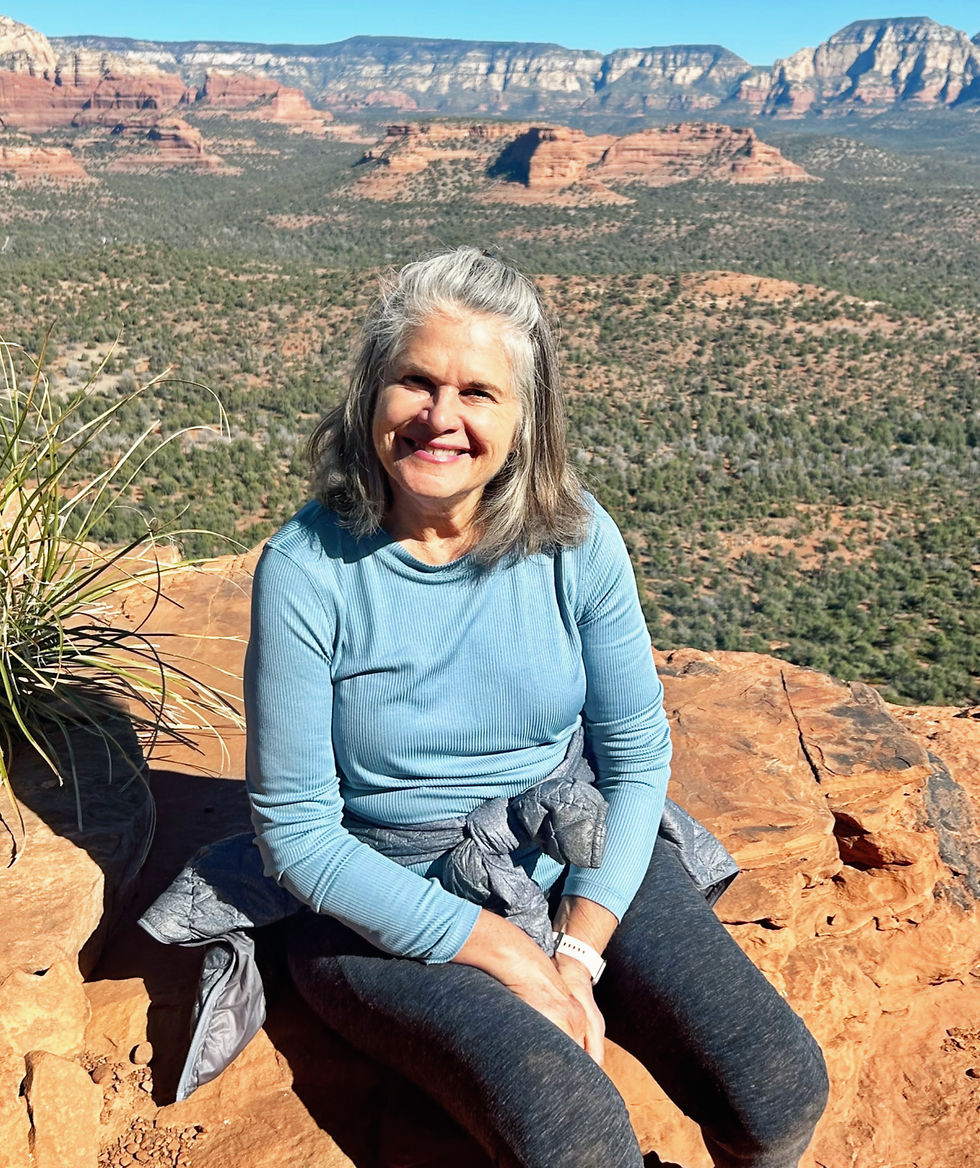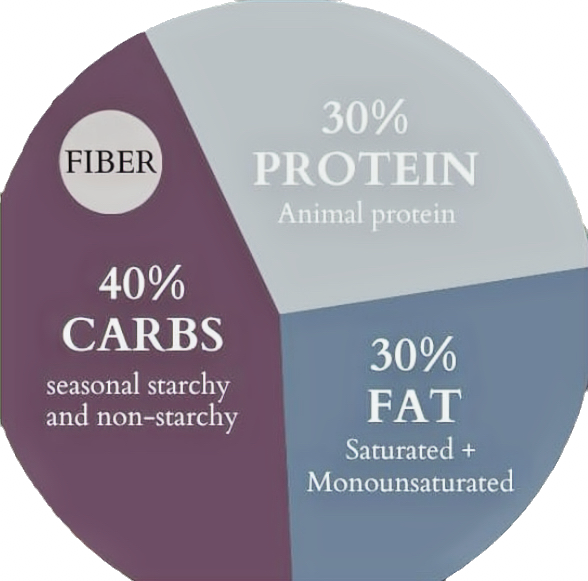How We Function Best
- janlindquist
- Jul 14, 2025
- 6 min read
Did you know that your body will always fight for balance because of or in spite of what we do or don't do?

This is a favorite picture, not because it's retouched, showing me in the best light with make-up and hair just right.
It's special because I'm hiking in this beautiful rugged place - Sedona Arizona.
Maybe you don't know this about me, but about 14 years earlier, I was heading home from several weeks at UCSF after experiencing a brain-stem stroke and some downstream bleeding issues that landed me in ICU. I originally began my stroke recovery in Turlock where I live, but I began to bleed internally which necessitated an ambulance ride to UCSF where they could begin to unravel what was happening and how to treat this new discovery.
I will be forever grateful for the many brilliant minds who puzzeled over my case with the goal of moving me towards healing.
My time in the hospital revealed how fragile we are, and how our body is always working toward keeping us alive.
This experience was formational and began to fan the flame of my natural curiosities and eagerness to know the why behind this experience.
Why Did This Happen?
My burning question was always; Why?
Why after receiving a great report from my annual physical just weeks before did this happen?
What did I do to contribute to this happening?
How can I avoid having another stroke?
Unfortunately, the modern medical system didn't have too many helpful answers. I was discharged with medications to lower my now high blood pressure, vertigo, split vision, inability to walk, trouble regulating talking and breathing, and numbness/shooting pain along my left side from my head to toes.
I was set up for physical therapy to address many of these issues and it was transformational in my recovery. I initially had physical therapy in my home and although it was hard work, I began to see improvements even graduating to therapy as an outpatient.
As my brain began to heal, my world began to become focused toward real healing. The good news was that I did re-learn how to walk, ride a bike, read with large print initially and finally emerge into a world that felt scary.
I had trouble following conversations if too many people were enjoying a conversation. I tired easily with a deep fatigue that just shut me down and I felt left out, but unable to actually enter in.
This was a hard year.
Reflections.
Yet, in spite of all of these challenges, I was healing and because of so many amazing family, friends and therapists who charted my course, showed up to watch over me, walk and feed me, I did indeed continue to gain more and more abilities that enabled me to engage in life fully.
Back to the hiking picture where I was now hiking narrow trails without fear of falling off the edge and enjoying the magnificient beauty of these mountains.
How Did I Get Here?
My stroke journey continued to keep me searcing for ways that would improve my health and protect me from another stroke. The compelling question that continues to resonate every day is this.
What could I do to become a healthy vibrant person who could feel free to live without fear of another stroke?
Because our body is always working for us, we must give it what it requires. -JanLindquist, NTP
Lessons Learned - Post Stroke
We need adequate and appropriate fuel [food] to feel good, and strictly limiting food groups as a way to thrive will backfire eventually.
Blood sugar dysregulation [out of balance] is the #1 reason that we have symptoms that cause us to feel off.
This is one of the most powerful ways to support our metabolism, hormones, mental health, digestion, adrenal function, and improve general stress resilence.
We can accomplish this through consistent quality fueling throughout the day using whole, real, nutrient-rich sources of protein, carbohydrates, and fats.
Beginning the day with coffee and a granola or energy bar is not going to do it!
Regularly skipping meals, constant fasting, eating "clean", eliminating carbs, using caffeine, willpower, or the newest fad diet will eventually stop working.
Steady consistent nourishment is what our body relies on.
There is no one-size-fits-all method to balancing our blood sugar.
Some of us will do well on three meals that are focused on adequate protein, fiber-rich carbohydrates, and quality fats with a snack or two. Some of us will will thrive with four small meals spaced throughout our day. And for others, two balanced meals each day will provide a perfect amount of food.
We need to begin to tune into our body and listen to what it's saying.
Key signs that blood sugar is balanced and our metabolism is working well:
Stable temperature and pulse
Steady energy throughout the day
Regular and comfortable digestion
Symptom-free menstrual cycle.
Sleeping 8 hours a night without waking up several times
Vibrant skin, healthy hair and strong nails
Building a Plate of Food to Support Best Health.

This is a good starting point to then figure out what works best for you overtime.
Too much protein without adequate fiber and carbs can have the same effect on blood sugar as too many carbohydrates without protein.
These ratios are a baseline and they can vary from person to person and depending on the day, taking into account activity level, genetics, digestion, individual goals, sleep, and what's actually going on in your life [stressors].
If we are very active we will definitely require more carbs than someone who lives a sedentary lifestyle.
It's vitally important to not discriminate against entire food groups, but to understand that each macro [protein, carbohydrate, and fat] has a purpose and is needed for our body to thrive.
When we spend decades restricting any macro group, we will begin to experience consequences to our health and well-being.
Protein - Slow Buring Fuel.
Protein is the main building block in our body. It's needed to maintain, repair, and replace tissues to function and grow. Protein is also needed to make neurotransmitters, hormones, and antibodies.
Therefore, focus on enough protein at each meal of at least 30g first. Then add fats & carbs to build out your balanced plate.
Protein from animal sources is the most bioavailable form, rich in nutrients like B vitamins, and are hard to get anywhere else. Try to add variety in your protein choices, not just muscle meats.
Eat These.
Pasture-raised Eggs
Wild-caught Fish
Grass-fed Beef
Pasture-raised, Pork, Chicken, Turkey, Lamb
Grass-fed & Raw Dairy
Bone Broth
Geletin
Collagen
Organ Meats
Wild Game Meats
Carbohydrates - Quick Burning Fuel.
Carbohydrate are our body's main source of energy and without them, our body must rely on stressful survival mechanisms to make it's own energy. Carbs are necessary for proper thyroid function, liver function, muscle building, and brain health. Literally every function in the human body.
Choosing quality carbs sources, not highly processed carbohydrates found in packaged and processed foods are a vital source of energy, fiber and minerals.
Eat These.
Seasonal fruits and cooked vegetables [best for digestion]
Root Vegetables
Squashes
Dates
Organic, Sprouted Oats [Farmer's Brand]
Honey & Maple Syrup [limited amounts]
Fats - Slowest Burning Fuel.
Fats assist our body to absorb fat soluble vitamins A,D,E,& K, and helps to regulate the rate at which we digest our food. Fat is needed to build cell membranes and hormones and fats also act as a protective lining for the organs of the body.
There are 3 types of fat:
Saturated - the most stable
Monosaturated - less stable
Polyunsaturated - unstable
Avoid consuming high amounts of polyunsaturated fats because they are very reactive to light, heat, and oxygen and they will turn rancid quickly. This includes seed oils and nuts & seeds left without their shells. To avoid nuts and seeds from turning rancid, store nuts & seeds in the freezer.
Eat These.
Olive Oil
Coconut Oil
Grass-fed Butter
Ghee
Grass-fed and Raw Dairy
Fats from Meats + Broths
Olives
Avocados
Coconut Milk
Pasture-raised Eggs
Dark Chocolate
When we strive to build out our meals by focusing on all of these deeply nourishng foods, we actually begin crowding out the less nutritious options that guarantee poor health.
This looks like; low energy, foggy brain, indigestion, achy joints and muscles, apathy, low moods, depression and a lot more!
We must begin to grow our understanding in how to feed our body well before the symptoms stack and damage runs deep.
It's a reality that our current food system is built on profit not health, and if we continue to rely on what the package says, the promise from influencers who are pushing products for profit without any regard of our situation, or continuing to fill our body with a quick fix of salt, sugar and fat, we will continue to experience symptoms that could be eliminated by eating well.
We have never been taught how to nourish ourselves and it's time to change.
You can do this and I'm here to help you.
You can find me here.
Thanks for reading,
Jan




Comments